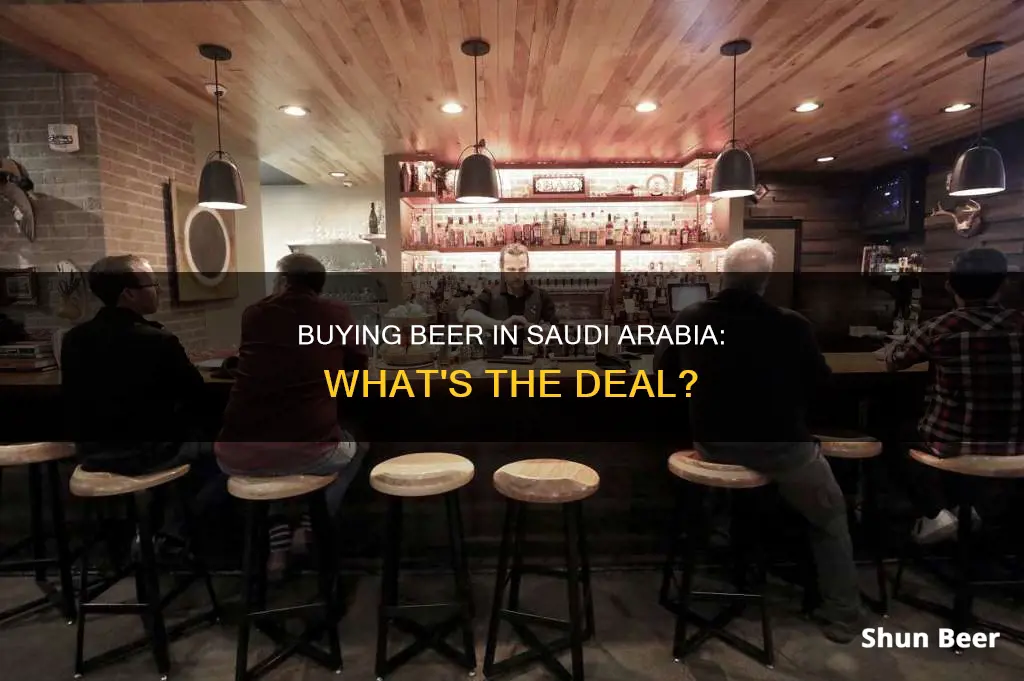
Saudi Arabia has long been known for its strict prohibition of alcohol, with laws against drinking alcohol punishable by deportation, fines, imprisonment, or even lashes. However, in 2024, the country made headlines by announcing the opening of its first alcohol shop in over 70 years. This shop, located in the Diplomatic Quarter of Riyadh, will be the first commercial outlet for the sale of alcohol since the ban on public sale and consumption of alcohol was imposed in 1952. But who will have access to this shop, and what does this mean for the future of alcohol sales in Saudi Arabia?
| Characteristics | Values |
|---|---|
| Alcohol sale in Saudi Arabia | Alcohol sale was legal in Saudi Arabia before 1952. However, it was banned by King Ibn Saud since 1952. In 2024, the regulation was reversed when it was announced that an alcohol shop will be opened in the Diplomatic Quarter of Riyadh, exclusively for non-Muslim diplomats. |
| Alcohol consumption in Saudi Arabia | Alcohol consumption in Saudi Arabia is highly regulated and restricted. Ordinary people who consume alcohol in the kingdom will be fined and jailed, and foreigners will also be deported. |
| Alcohol as part of Riyadh life | Alcohol will become part of Riyadh life with the opening of the first alcohol shop in the city. However, drinkers need to be mindful of where they drink and how they behave afterwards to avoid penalties. |
| Penalties for alcohol consumption or possession | Under current Saudi law, penalties for consumption or possession of alcohol can include fines, jail time, public flogging, and deportation for unauthorised foreigners. |
| Alcohol quotas | There will be monthly limitations or quotas on alcohol purchases in the new alcohol shop in Riyadh. Patrons will be limited to 240 "points" of alcohol per month, with different beverages worth a varying number of points. |
| Age restriction | Only individuals above the age of 21 will be allowed in the alcohol shop in Riyadh. |
| Dress code | Proper attire is required at all times inside the alcohol shop in Riyadh. |
What You'll Learn

Alcohol was banned in Saudi Arabia in 1952
The ban on alcohol in Saudi Arabia has led to a thriving underground alcohol scene, with locals and expatriates regularly attending secret parties and events where alcohol is consumed. Despite the ban, there have been reports of alcohol being available in the country through the black market, with bottles of whiskey sold for high prices.
In recent years, there have been some discussions and attempts to relax the alcohol ban in Saudi Arabia. In 2024, the country opened its first alcohol shop in the Diplomatic Quarter of Riyadh, but it is only accessible to non-Muslim diplomats. This move was made to combat the black market and illegal imports of alcohol into the country. However, some people fear that this is the first step towards wider availability, which would be a significant shift from the country's longstanding prohibition.
The decision to relax the alcohol ban, even in a limited capacity, is part of Saudi Arabia's Vision 2030 reform agenda, led by Crown Prince Mohammed bin Salman. The country aims to diversify its economy away from fossil fuels and attract more foreign tourists and expatriates by creating a modern image. However, any changes to the alcohol laws will likely be gradual and targeted to avoid unsettling the more conservative elements of Saudi society.
Best Places to Buy Lone Star Beer
You may want to see also

The first alcohol shop in 70 years opened in 2024
After a ban of over 70 years, an alcohol shop is set to open in Saudi Arabia. The shop, located in the Diplomatic Quarter of the capital, Riyadh, will be the kingdom's first commercial outlet for the sale of alcohol since 1952.
The store will be accessible only to non-Muslim diplomats, who will have to present diplomatic identification to purchase anything. Customers will also have to register via a mobile app and abide by monthly quotas. Drinkers will not be able to send a proxy, such as a driver, to collect alcohol on their behalf. In addition, no one under the age of 21 will be allowed in the store, and "proper attire" will be required at all times inside.
The decision to open the shop was made to combat the black market and illegal imports of alcohol into the country. Alcohol frequently enters Saudi Arabia through diplomatic consignments, and some embassies host off-licences that sell alcohol to their diplomats. Diplomatic staff have also been able to import limited amounts of alcohol using "diplomatic pouches", which cannot be tampered with by the authorities in their host country.
The opening of the alcohol shop is part of a series of initiatives known as "Vision 2030" to liberalise Saudi society under the crown prince and de facto ruler of the country, Mohammed bin Salman. These initiatives include the end of a ban on women driving, the removal of female travel restrictions, and the end of gender segregation in restaurants.
While the shop opening represents a very modest adjustment to the kingdom's strict prohibition on alcohol, it could be a first step towards wider availability of alcohol in Saudi Arabia. Some Riyadh residents see the development as a move towards a dramatic break from the nationwide prohibition. However, others worry about what the sale of alcohol will mean for the kingdom's identity and culture.
St. Patrick's Day Special: Buying Green Beer
You may want to see also

Only non-Muslim diplomats can buy alcohol
In a historic move, Saudi Arabia is set to open its first alcohol shop in over 70 years. However, the sale of alcohol will only be accessible to non-Muslim diplomats. Located in the Diplomatic Quarter of the capital, Riyadh, the store marks a carefully managed operation by the leaders of the teetotal Gulf kingdom.
The decision to allow alcohol sales to non-Muslim diplomats has sparked varied reactions among Saudi Arabia's citizens and foreigners. While some see it as a positive step towards modernisation and attracting more foreign investment, others worry about the potential impact on the kingdom's identity and culture. It is important to note that alcohol is banned in Islam, and Saudi Arabia is home to the Muslim holy places of Mecca and Medina.
To purchase alcohol from the store, non-Muslim diplomats must present diplomatic identification and register via an application or mobile app. The store will enforce purchasing quotas, with patrons limited to 240 "points" of alcohol per month. One litre of spirits will be worth six points, one litre of wine three points, and one litre of beer one point.
The Saudi government has stated that the introduction of this regulated process aims to counter the illicit trade of alcohol and impose more control on alcoholic beverages entering the country through diplomatic missions. This move aligns with Saudi Arabia's strategy, led by Crown Prince Mohammed bin Salman, to open up the ultra-conservative Muslim country to tourism and business as part of the Vision 2030 reform agenda.
Short Boys Beer: Where to Buy?
You may want to see also

Alcohol sale and consumption is forbidden in Islam
The Quran contains several verses that discourage alcohol consumption, including one that states: "O you who have believed, indeed, intoxicants (khamr), gambling, [sacrificing on] stone altars [to other than God], and divining arrows are but defilement from the work of Satan, so avoid it that you may be successful."
Another verse warns Muslims against attending prayers in a drunken state: "O you who acknowledge, Do not go near prayer, (Salat) while you are stupified (under influence), until you know what you are saying."
Prophet Muhammad also cautioned against alcohol consumption, stating that if a substance intoxicates in a large amount, it is forbidden even in a small amount.
In addition to the religious prohibitions, there are several practical reasons why alcohol sale and consumption is forbidden in Islam. Alcohol is addictive, and it can negatively impact a person's health and well-being. It can cloud a person's intellect, making it difficult to distinguish between right and wrong, which is contrary to the principles of the Muslim faith. Alcohol consumption is also associated with criminal activity, as it lowers inhibitions and can lead to impulsive behaviour.
While alcohol sale and consumption is generally forbidden in Islam, there is some variation in how this prohibition is applied in different Islamic countries. Some countries, like Saudi Arabia, have a complete ban on alcohol, while others, like Jordan and Egypt, allow alcohol to be sold and consumed under certain restrictions.
In Saudi Arabia, the sale of alcohol was banned in 1952 by King Ibn Saud. However, in 2024, the country took a step towards relaxing its alcohol laws by allowing the sale of alcohol to non-Muslim diplomats in a shop located in the Diplomatic Quarter of Riyadh. This decision was made to combat the black market and illegal imports of alcohol. Despite this change, alcohol remains illegal for the vast majority of people in Saudi Arabia, and those who consume alcohol can face fines, imprisonment, and deportation for foreigners.
Kentucky Election Day: Beer Buying Rules Explained
You may want to see also

Saudi Arabia is trying to attract more foreign nationals
The country is aiming to develop internationally oriented business communities and hubs, which will require employment and social conditions that attract highly skilled foreign nationals. As part of this, Saudi Arabia has implemented a range of social reforms, including the opening of cinemas, the hosting of music events, the promotion of large cultural and sporting events, the end of gender segregation in restaurants, the removal of a ban on women driving, and the removal of female travel restrictions.
Saudi Arabia is also trying to attract foreign investment in sectors such as infrastructure, tourism, entertainment, health, science, technology, and renewable energy. The country aims to become a major transport and logistics hub linking Asia, Europe, and Africa, and has introduced a tourist visa, an e-visa, and a free 96-hour "stopover" visa to attract visitors.
The country's efforts to attract more foreign nationals are also reflected in its attempts to relax alcohol laws. In 2024, Saudi Arabia opened its first alcohol shop in the Diplomatic Quarter of Riyadh, accessible only to non-Muslim diplomats. This move has been positioned as a way to control the illicit trade of alcohol, which frequently enters the country through diplomatic consignments. While this is only a minor policy change, it could be a step towards making alcoholic beverages available to non-Muslim tourists and expatriates, as is the case in other Gulf Arab states.
However, Saudi Arabia's efforts to attract foreign nationals have been met with challenges. The country has a history of relying on foreign labour, particularly in technical positions and the agriculture, cleaning, and domestic service industries. In recent years, the government has implemented policies to replace foreign workers with Saudi nationals, leading to an exodus of over 1 million foreign workers since 2017. This has added to a sense of uncertainty in the country and created challenges for business owners.
Additionally, investor concerns about Saudi Arabia's business predictability, transparency, and political risk persist, and the country's stringent social regulations are considered problematic by potential expatriates and tourists.
Buying Beer at Kinnick Stadium: Is It Possible?
You may want to see also
Frequently asked questions
Yes, but only if you are a non-Muslim diplomat. In 2024, Saudi Arabia opened its first alcohol shop in over 70 years, but it is located in the Diplomatic Quarter of Riyadh and only accessible to non-Muslim diplomats who present diplomatic identification.
Aside from the restriction that only non-Muslim diplomats may purchase alcohol, there are several other limitations. Customers must register via a mobile app and receive clearance from the government. Drinkers cannot send a proxy to pick up alcohol for them, and there are monthly limitations on purchases. Drinkers must also wear "proper attire" inside the store.
Ordinary people who consume alcohol in Saudi Arabia can be fined, jailed, or flogged, and foreigners will be deported.
The Saudi government claims that the shop was opened to counter the illicit trade of alcohol and impose more control on the alleged illegal importation of alcohol through diplomatic missions. However, some believe that it is the first step towards wider availability of alcohol in the kingdom.
Alcohol was legal in Saudi Arabia before 1952, but it was banned by King Ibn Saud (also known as King Abdulaziz) after one of his sons drunkenly shot and killed a British diplomat.







